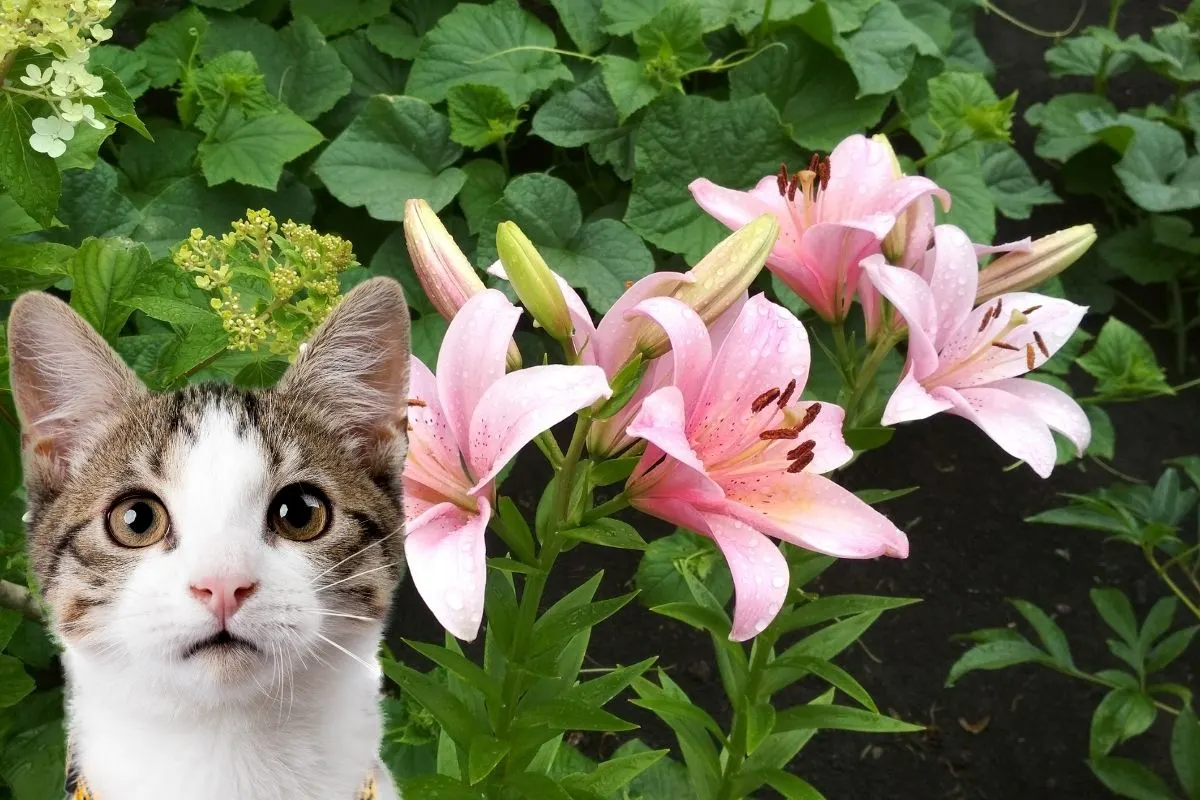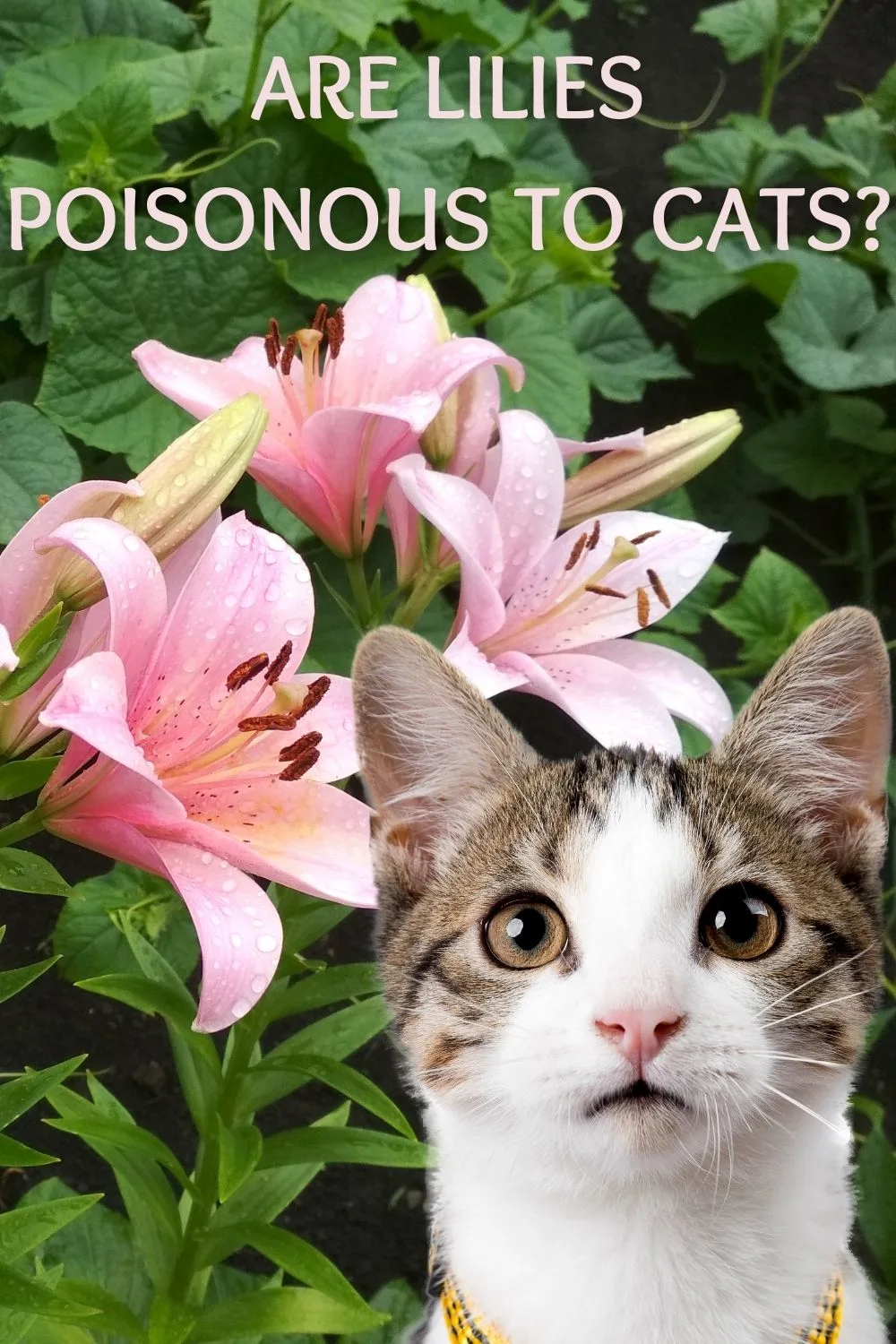Lilies are a beautiful, common flowering plant found outdoors in gardens and also inside in bouquets. But are lilies poisonous to cats? Though lilies are a beautiful addition to any home, many people are unaware of the fact that they can be poisonous to cats.
The answer is a firm yes. Lilies ARE poisonous to cats. In fact, some consider them to be the most toxic plant. All parts of the lily plant contain toxins that can cause kidney failure in cats and ingesting even a small amount can be deadly.

This is not a plant that you want your cats to come into contact with. That said, it’s important to know how to identify lilies. There are also many flowers that look like lily, or even some that have lily in their name but that are not true lilies.
What Are Lilies?
Lilies are a type of flowering plant that comes in a wide variety of colors, shapes, and sizes. They are native to temperate and tropical areas all over the world and are a popular choice for gardens and bouquets alike. While lilies come in many different forms, they all share some common features, such as large, showy flowers and long, linear leaves. This is what makes them so beautiful to look at and so popular.
They are most often associated with purity and innocence, making them a popular choice for weddings and other special occasions. However, they can also represent legacy and transcendence, as they often bloom even after the first frost. No matter what they symbolize, lilies are sure to add beauty and elegance to any setting.
Types of lilies

Before you can truly understand how lilies impact cats, you need to understand the types of lilies. There are “true lilies”, which are lilies by scientific definition. And then there are also plants that resemble these true lilies but are actually copycat plants. It can be hard to tell the difference with an untrained eye.
In many cases, the copycat plants are not harmful to your cats. However, you don’t want to take a chance on your cat’s life.
The most common lily is the Easter lily, which is native to Japan. Other popular varieties include the Asiatic lily, the Oriental lily, and the stargazer lily. Lilies typically have large, showy flowers and long, slender leaves. They grow from bulbs, and most lilies prefer full sun and well-drained soil.
Here are some facts about lilies:
- True lilies belong to the genus Lilium, which contains around 110 different species.
- The lily is the national flower of Denmark, and it is also used as a symbol of peace in many other countries.
- Lilies are native to temperate regions of the Northern Hemisphere
What about peace lilies?

Peace lilies are not true lilies (Lilium spp.) at all but are members of the Araceae family. If you have a cat, you may have wondered if peace lilies are safe to have around the house. After all, lilies are well-known for being toxic to felines.
The good news is that peace lilies are not true lilies, and they are not toxic to cats. However, this does not mean that they are completely safe. The leaves and stems of peace lilies contain saponins, which can cause stomach upset if your cat ingests them.
In addition, the pollen of peace lilies can be an irritant to cats, causing runny eyes and sneezing. So, while peace lilies are not harmful to cats in the same way as true lilies, it is best to keep them out of reach.
Lilies Are Highly Toxic For Cats
Many people are unaware that lilies are poisonous to cats. If you suspect that your cat has ingested a lily, it is important to seek veterinary care immediately. With prompt treatment, the prognosis for lily toxicity is generally good. However, if left untreated, lily toxicity can be fatal. So, if you have a cat AND lilies in your home, it is important to take precautions to keep them separated. The safest bet is just not to bring them in your home at all.
Learn more about plants that are poisonous to cats.
What parts of the lily are toxic to cats?
All parts of the lily plant are poisonous to cats, including the stem, leaves, flowers, and pollen. If your cat ingests any part of a lily, it can experience symptoms of illness. In some cases, even smelling the lily or breathing in the same room as can cause negative health consequences for your cat. Fortunately, lily toxicity is easily preventable. You just have to avoid bringing them into your home at all.
Signs of Lily Poisoning in Cats
If your cat ingests any part of a lily plant, it’s important to seek medical help as soon as possible. You can call the animal poison control line from the ASPCA at 888-426-4435 24 hours a day for advice.
Signs of lily poisoning can include:
- vomiting
- diarrhea
- lethargy
- lack of appetite
- excessive thirst
In more severe cases, there could be:
- acute kidney failure / renal failure
- seizures
- death
And in some cases, your cat may not show any visible signs at all until it is too late. Cats are great at hiding when they are sick or in pain.
The importance of acting fast if poisoning occurs
It’s important to seek treatment within hours of ingestion for best results. As soon as you suspect or know that your cat has eaten lily, contact your vet immediately. In fact, if you even suspect your cat has consumed ANY part of a lily plant, it is important to seek veterinary care quickly. With prompt treatment, many cats recover fully from lily poisoning. However, it is always better to be safe than sorry when it comes to this dangerous flower.
Treatment of Lily Poisoning in Cats
Treatment typically involves inducing vomiting and giving the cat intravenous fluids to flush the lily toxins out of their system. In severe cases, a cat may need to be hospitalized for a few days to receive around-the-clock care. It all depends on how much they’ve ingested and how seriously the plant has affected them.
Prevention is the best medicine
As with all toxic plants, prevention is always the best approach. Cats are curious creatures, and their curiosity often gets the best of them. Unfortunately, this can sometimes lead to them ingesting plants that are harmful to their health.
Here are some tips to keep your feline friend safe:
- Keep lilies out of reach. If you have lilies in your home, make sure they are kept in a place where your cat cannot reach them.
- Keep cats out of the garden. If you have lilies in your garden, take measures to keep your cat out (keep your cat indoors, cage in the flowers, etc.)
- Provide the cat with pet grass or catnip, and they won’t be interested in toxic plants anymore
Are Lilies Poisonous to Cats? – Conclusion
We can easily conclude from this info that yes, lilies are poisonous to cats. The safest thing you can do is not ever bring any lilies into your home. There are a lot of plants that can make cats sick but true lilies are at the very top of the “no no” list if you have cats in your home.

Lisa Clark is a freelance writer who grew up on farmland, then moved to the city, and has now retired back to her rural roots. She's having fun teaching her kids about gardening, planting flowers, and collecting houseplants.


